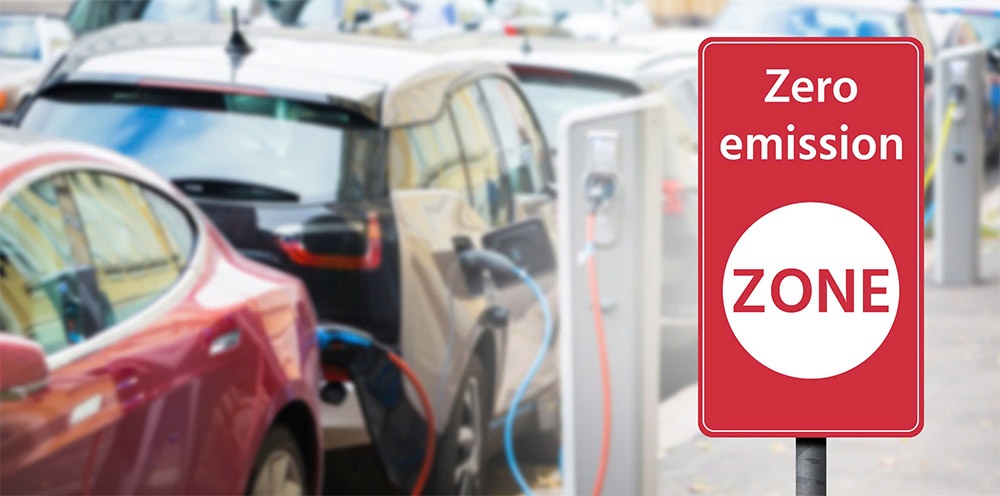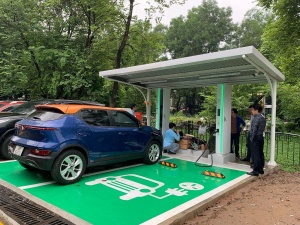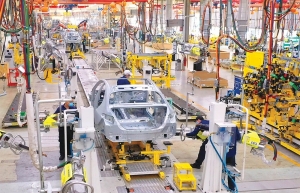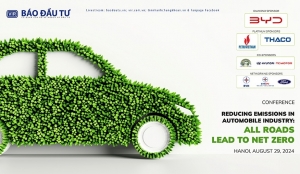Tech players take on EV charging infrastructure
In mid-August, PetroVietnam Power Corporation (PV Power) injected over $70,000 to build a pilot electric vehicle (EV) charging station in Hanoi, marking its foray into Vietnam’s fledging EV charging station market.
 |
| Tech players take on EV charging infrastructure |
The pilot is part of an MoU signed between PV Power and EN Technologies in June 2023, in which the two sides aim to research and develop a charging network.
The government is speeding up the transition from traditional cars to EVs, with demand for such vehicles predicted to rise. Infrastructure for EV charging stations is essential to the increasing use of EVs in Vietnam in order to maintain efficient traffic flows. Investing in EV charging stations is a strategic move that will allow PV Power to expand its operations and provide new business opportunities, the company said.
Elsewhere, in late June, Singapore EV charging firm Charge+ and Porsche announced a project to develop 17 high-powered charging points spanning over 1,700km in Vietnam over the next three years. The project is highly synergistic with Charge+’s ongoing implementation of an EV charging highway that spans 5,000km across Singapore, Malaysia, Thailand, Cambodia, and Vietnam, the longest EV charging backbone in the region.
Khoa Tran, country head of Charge+ Vietnam, told VIR, “Vietnam’s EV charging infrastructure is expanding, led by VinFast and joined by new players, including Charge+. The government supports EV adoption, but regulations and incentives are still evolving. The burgeoning EV market presents opportunities for us to establish a strong presence.”
Charge+ plans to deploy a nationwide fast-charging network, making EV charging more accessible. Its innovative ultra-slim dual EV charger and smart charging software address space and energy constraints, appealing to businesses and public spaces, Tran said. Additionally, Charge+ offers customisable solutions for property owners and automotive partners, allowing them to tailor pricing and access controls.
“Charge+ is ready to scale its infrastructure as demand grows, drawing on experience in other Southeast Asian markets. However, infrastructure readiness remains a challenge. Grid upgrades may be needed in some areas, impacting station deployment costs and timelines. Meanwhile, evolving policies create uncertainty and potential delays in obtaining approvals,” Tran added.
Another challenge is to ensure compatibility and integrating advanced technologies for efficiency and user experience. High upfront and operational costs also pose financial challenges, and the network’s success hinges on EV adoption and public awareness, he said.
Another company, EBOOST, also has a plan to reach over 5,000 EV charging points by the end of 2025 across the country. EBOOST currently offers more than 1,500 charging points at various locations in the country, both for e-cars and e-bikes. Any brand of vehicle can access and charge at EBOOST stations, unlike Vinfast offerings.
Founder and CEO Stefan Kaufmann said, “The key to running a viable e-charging business on its own is demand. Vietnam needs brands both for e-cars and e-bikes to enter and establish the market to educate and convince vehicle buyers to actually switch to EV. With that, users will get a choice of different brands, pricing, and performance – this is a must to accelerate the transition and thus generate enough demand for EV charging providers to operate and grow.”
Meanwhile, Foxconn announced that it will build an EV charging and component production plant in Vietnam through a $250 million investment, which will help facilitate a more rapid expansion of the local and Southeast Asia regional EV charging networks.
According to a 2024 report by KPMG, building charging capacity should be a top priority for promoting EVs, as the availability of charging stations is the most critical factor influencing the purchasing decisions of future EV buyers. The Vietnam Automobile Manufacturers’ Association predicts that Vietnam will have about one million EVs operating in 2030 and 3.5 million EV in 2040.
To promote the development of the EV charging landscape, Vietnam is researching incentive policies related to land, planning, and taxes for EV charging station companies. The country also plans electricity subsidies for EV charging stations.
“To further support the EV ecosystem, Vietnam should consider streamlining regulations across transportation, electricity, and safety sectors,” Tran from Charge+ Vietnam said. “The country should strengthen the grid and increase renewable energy integration, especially along highways. Efforts should be made to offer subsidies and tax incentives for EV infrastructure investments and equipment. Regulations also need to be provided for charger installation, particularly in enclosed parking, addressing fire safety.”
In the same vein, EBOOST’s Kaufmann noted that there is support to incentivise the EV transition.
The key is to focus on two major areas. First is how the government can encourage demand and support early adopters and willing vehicle owners to buy and switch to an EV. The second factor is how the government can establish standards and guidelines around the e-charging business and infrastructure,” Kaufmann said.
“This can be practical guidance on what is required (from a construction and standards point of view) at various locations, or this can be more bold moves such as obligations to actually provide e-charging facilities at certain locations and buildings,” he added.
 | PV Power invests over $70,000 to build electric vehicle charging station in Hanoi Petrovietnam Power Corporation (PV Power) is building a pilot electric vehicle (EV) charging station in Hanoi, marking its entry into Vietnam's fledging EV charging station market. |
 | China’s EV inroads ring alarm bells A wave of car manufacturing factory closures in Thailand is spreading due to China’s aggressive electric vehicle entry and price cuts, posing questions for other countries in Southeast Asia. |
 | Supporting a green strategy for the automotive industry With 6.5 million cars and 74 million motorcycles, Vietnam is the second-largest emitter of greenhouse gases (GHGs) from road transport in Southeast Asia, following Indonesia. Emissions from road vehicles in the country are rising rapidly, with an average annual increase of about 15 per cent over the past decade. |
 | EV strategy must prioritise keeping the pace globally Under Vietnam’s vehicle industry development strategy, electric vehicles (EVs) require robust support from government policies to contribute effectively to the country’s net-zero commitment. |
What the stars mean:
★ Poor ★ ★ Promising ★★★ Good ★★★★ Very good ★★★★★ Exceptional
Related Contents
Latest News
More News
- Masan Consumer names new deputy CEO to drive foods and beverages growth (February 23, 2026 | 20:52)
- Myriad risks ahead, but ones Vietnam can confront (February 20, 2026 | 15:02)
- Vietnam making the leap into AI and semiconductors (February 20, 2026 | 09:37)
- Funding must be activated for semiconductor success (February 20, 2026 | 09:20)
- Resilience as new benchmark for smarter infrastructure (February 19, 2026 | 20:35)
- A golden time to shine within ASEAN (February 19, 2026 | 20:22)
- Vietnam’s pivotal year for advancing sustainability (February 19, 2026 | 08:44)
- Strengthening the core role of industry and trade (February 19, 2026 | 08:35)
- Future orientations for healthcare improvements (February 19, 2026 | 08:29)
- Infrastructure orientations suitable for a new chapter (February 19, 2026 | 08:15)

 Tag:
Tag:


















 Mobile Version
Mobile Version